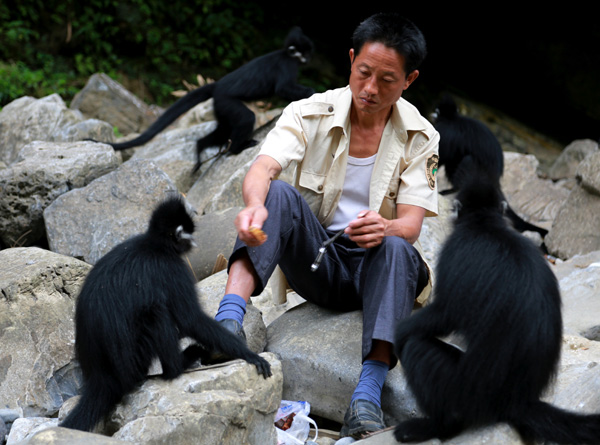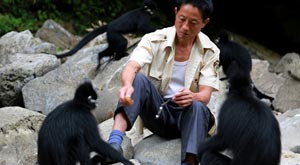Tamer takes care of rare-monkey business
China Daily, October 14, 2014 Adjust font size:
Xiao Zhijin's routine has been unchanged for decades. At 8 am he treks several kilometers to a river valley, bringing breakfast to his friends of 26 years. No words are spoken, but the communication is excellent.
|
Xiao Zhijin feeds Francois' langurs in a nature reserve in Guiyang, Guizhou province, in September. YANG JUN/CHINA DAILY |
Those waiting for breakfast are Francois' langurs, one of the world's rarest monkeys. Named after Auguste Francois (1857-1935), a French diplomat based in southern China, the monkeys have a distinctive look with black, silky hair and distinctive white sideburns that grow from their ears to the cheeks.
Xiao, 52, first came into contact with the monkeys as a forest ranger in 1987, but it was another 10 years before he actually took charge of monitoring and taming them at the Mayanghe Nature Reserve in the Yanhe Tujia autonomous prefecture of Guizhou province.
On arrival at the spot on the Mayanghe River, Xiao gave a three-whistle signal, and 10 langurs rushed to meet him as he handed out potato chips.
"There should be 11," Xiao said, unable to hide his concern. "Maybe the missing one is dead."
While Xiao has a special relationship with the langurs, nearby villagers once had a different outlook and regarded them as pests.
"No one could get close to them, the little robbers, except him," one villager said with a smile, referring to Xiao.
Fed up with the monkeys stealing corn and grain, locals nicknamed them "Yanzhu monkeys", which literally means "greedy pigs" inhabiting rocks and caves.
The villagers didn't realize the importance of the langurs until the Mayanghe Nature Reserve was upgraded to a national reserve in 2003.



